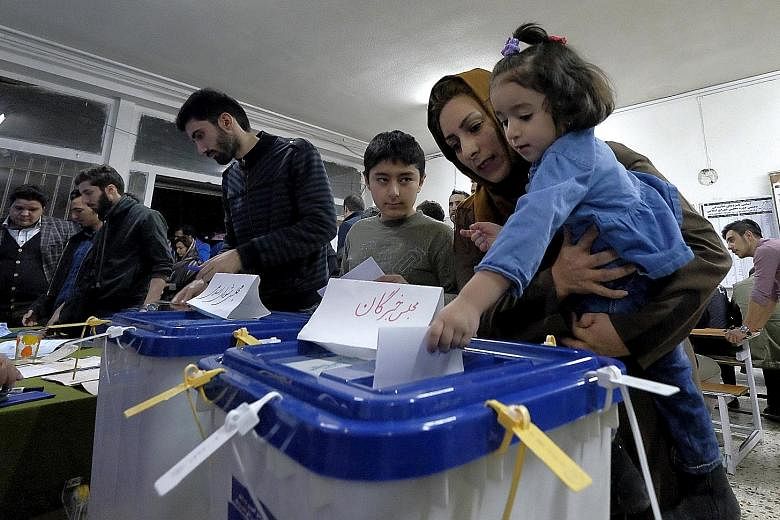TEHERAN • Moderates and reformists supporting President Hassan Rouhani appeared to have made a strong showing in high-stakes elections that could speed up or slow Iran's post-sanctions opening to the world, according to early unofficial results yesterday.
Tens of millions thronged polling stations on Friday to vote for Parliament and the Assembly of Experts in polls seen by analysts as a potential turning point for Iran.
Nearly 60 per cent of Iran's 80 million population is under 30.
Interior Ministry officials said counting of the votes in Teheran and other cities was still not final.
However, preliminary results published by the semi-official Fars and Mehr news agencies indicate reformists and independents linked to them were leading against hardliners in several cities.
Even if reformists do not emerge with a majority in the 290-seat legislature, dominated since 2004 by anti-Western conservatives, analysts say they will secure a bigger presence than in previous elections.
"Initial counting shows tight competition between the two sides," an official Iranian source said.
"It is still too early to determine who will come out on top, as votes are still being counted in Teheran and outside."
A Reuters survey suggested the pro-Rouhani camp and independents were leading in the parliamentary vote. Some moderate conservatives, including Speaker Ali Larijani, support Mr Rouhani.
The first batch of results approved by the Guardian Council, which supervises elections, showed that eight reformists, nine independents and 11 hardline "principlists" won seats.
Conservatives usually perform well in the countryside while young town dwellers tend to prefer moderate candidates.
Reformists seeking more social and economic freedoms and diplomatic engagement voiced high hopes of expanding their influence or even taking control of Parliament, and of easing the conservative clerics' grip on the 88-member Assembly of Experts that chooses the supreme leader.
Political analyst and economist Saeed Leylaz said initial indications were beyond reformists' expectations, adding: "I am hopeful the new Parliament will be perfect for us."
Iran, which has the world's second-largest gas reserves, a diversified manufacturing base and an educated workforce, is seen by global investors as a huge emerging-market opportunity, in everything from cars to airplanes and railways to retail.
For ordinary Iranians, the prospect of this kind of investment holds out the promise of a return to economic growth, better living standards and more jobs in the long run.
An opening to the world and Mr Rouhani's popularity have alarmed allies of Supreme Leader Ayatollah Ali Khamenei, who fear losing control of the pace of change, as well as erosion of the lucrative economic interests they built up under sanctions.
REUTERS

